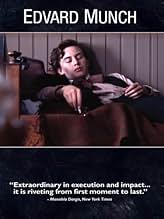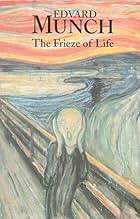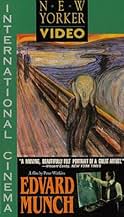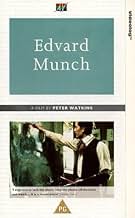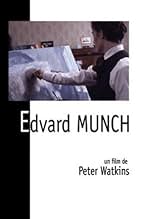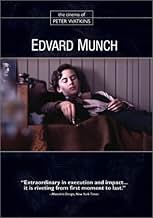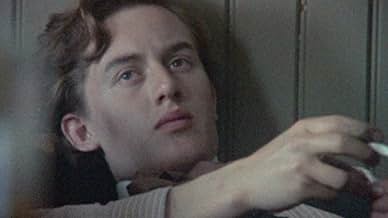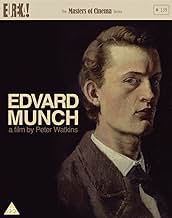Ajouter une intrigue dans votre langueThis biopic of Norwegian Expressionist painter Edvard Munch focuses on the influences that shaped his art, his devastating affair with a married woman that will haunt him for the rest of his... Tout lireThis biopic of Norwegian Expressionist painter Edvard Munch focuses on the influences that shaped his art, his devastating affair with a married woman that will haunt him for the rest of his lifeThis biopic of Norwegian Expressionist painter Edvard Munch focuses on the influences that shaped his art, his devastating affair with a married woman that will haunt him for the rest of his life
- Réalisation
- Scénario
- Casting principal
- Victoire aux 1 BAFTA Award
- 2 victoires au total
- Inger Munch - 1875
- (as Anne Marie Dæhli)
Avis à la une
I had no idea how bleak Norwegian life was yet as the film postulates it is out of bleakness new ideas can flourish.
I enjoy the film most when 19th century life in the Norwegian city of Kristiania (Oslo) is described. The legalized prostitution, the walks/promenades, the puritan lifestyle.
I enjoyed it least post Munch's affair/relationship I understand Munch's obsession with his lover and I think they match it well with his desire to create art yet this I feel is also the weakest part of the film. The endless shot of him and her post relationship give the film a monotony that had me checking my watch and wondering "how long IS this film?"...
Still I feel it is worth watching as the way the film is shot has it moments when it makes you feel part of the Bohemian culture and pub life. It was like I was there, especially when the actors look into the camera.
It is also interesting to note that the actors had a huge part in creating and contributing lines to the film. A truly collaborative film...
The style is one that mixes historical dramatization with documentary, one that through stream of consciousness editing attempts to immerse us not only into the period, but into Munch's mind. The actors regularly break the fourth wall which is a little jarring at first, but it creates an intimacy, as if you're in the room or they're speaking to you from across time.
I loved how the film set the context of life in Norway during this time - the poverty, the lack of child labor laws, the unfair treatment of women, and diseases like consumption/tuberculosis killing people at young ages. It also does a great job in immersing us into the bohemian circle Munch frequented early in his life, led by the radical Hans Jæger, as well as the intelligentsia he connected to later in Germany, led by ex-pat August Strindberg. These views of anarchism, free love, and severing ties to families were a part of what shaped him, though he always remained a little apart from it. The misogyny of the period is on full display, both from conservatives who believed women should simply be kept in the home, and from writers like Strindberg who believed women were inferior and had evil intentions. Unfortunately, Munch was also a misogynist, and to its credit, the film doesn't try to hide this fact.
It also explains the trauma in Munch's life, with his mother dying when he was 5, his favorite sister Sophie dying when he was 14, the conflicts he had with his father, and his difficulties in relationships. These personal forces involving angst, isolation, and melancholy, along with what was happening in the art world at this time (which is also well represented), are what shaped Munch as an artist. I loved the scenes of Munch creating his artwork, as there are some very nice reenactments and demonstrations of the techniques and media he used. The vicious criticism of his work in Norway, Germany, and Denmark is well captured, though it misses one of Munch's better known responses to realist painter Gustav Wentzel, who shouted at Munch "Shame on you. I had no idea that you were going to start painting that kind of thing. That sort of rubbish." Munch replied, "Well, we cannot all paint nails and twigs."
The editing style which serves the film so well early on eventually becomes a detractor though. There are times when it's unclear who's talking, and if what we're listening to are words that are from a diary or letter verbatim, or a historical dramatization. Again and again over the full run time we see cuts to footage of old lovers and a childhood sickbed scene, coughing up blood. There is also far too much detail on the love lives of people in Munch's circle, and this is to the detriment of leaving a lot of things out about Munch's old life. There is essentially nothing presented after 1895, when Munch was 32.
Here are just some of the things it leaves out:
- The literature that impressed Munch the most deeply was Poe's "Tales of Mystery and Imagination", and Dostoevsky's "The Idiot" and "The Brothers Karamazov". Like Dostoevsky, Munch was a gambler (though in Monte Carlo instead of Baden-Baden), believing he had a "system" at roulette.
- Munch's tumultuous relationships with Tulla Larsen and Eva Mudocci. At the end of his relationship with Larsen, she threatened to shoot herself, and when the revolver went off accidentally, it severed the top two joints of one of the fingers on Munch's left hand. See Larsen in good times in "Mathilde (Tulla) Larsen" (1898) and bad in "Sin (Nude with Red Hair)" (1901). See Mudocci in "Madonna (The Brooch)" (1903) and "Salome" (1903).
- His years wandering about Europe like a vagabond, excessively drinking, feeling persecuted, and depressed. He was involved in brawls, including one in which he "ran amok and assaulted several complete strangers in a hotel in Hamburg." His nervous breakdown in 1908, at the age of 45, would lead to confinement and shock therapy. Compare his paintings before and after this: "Self-Portrait with Wine Bottle" (1906) and "Self-Portrait at Clinic" (1909).
- Munch's deep sympathy with socialism and worker's rights. Here is what he said about communism: "I believe in what the Russians are trying to do, they have got the chance now. During the French Revolution it was the bourgeoisie who were fighting for their rights, now it is the workers, which is just as it should be." See his painting "Workers Returning Home" (1913-15). I always hate when these sides of an artist or historical figure are left out (e.g. Helen Keller).
- Munch eventually arriving at a place of greater peace. See the calmness and resignation in "The Dance of Death" (1915).
- The great controversy surrounding the competition to be selected as the artist for the Oslo University murals, which Munch was eventually awarded. See his absolutely brilliant painting "The Sun" (1916).
- Munch remained vital through his life. Towards the end he would paint the same subject on several canvases simultaneously, to allow for experimentation. Unfortunately, he would have a new set of German "art critics" to suffer: his work was branded degenerate by the Nazis, thrown out of German galleries, and sold to fund their war effort. When Norway became occupied by the Nazis when he was in his late seventies, his home and art studio were threatened by nearby tanks and anti-aircraft batteries. Munch painted on, but an explosion of a munitions dump blew out all of the windows of his house, and in the aftermath Munch contracted bronchitis and passed away.
If the film had been of conventional length, I could have appreciated the focus on his first 32 years, but that's less forgivable for me at 221 minutes. It's enjoyable nonetheless. For those interested in Munch, I'd also highly recommend the 1977 book by distinguished art historian Ragna Stang, which includes a very well researched account of his life and literally hundreds of plates of his art.
Le saviez-vous
- AnecdotesThis film has a 100% rating based on 13 critic reviews on Rotten Tomatoes.
- Citations
Narrator: I felt as if there were invisible threads between us. I felt as if invisible threads from her hair still twisted themselves around me. And, when she completely disappeared there, over the ocean, then I felt still how it hurt, where my heart bled, because the threads could not be broken.
- ConnexionsReferenced in A Discussion with Peter Watkins (1977)
Meilleurs choix
Détails
Box-office
- Montant brut aux États-Unis et au Canada
- 43 539 $US
- Week-end de sortie aux États-Unis et au Canada
- 3 961 $US
- 19 juin 2005
- Montant brut mondial
- 76 949 $US

